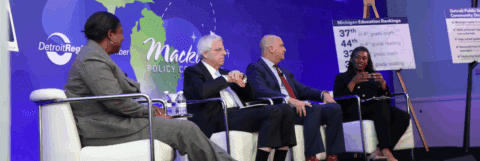Public education requires support from all Michiganders to succeed, and it is in the best interest of Michigan to invest in the next generation of talent. During this 2025 Mackinac Policy Conference session, hosted by Detroit Public Schools Community District Foundation, public education leaders from across the state discussed their ideas and actions to move Michigan’s K-12 programming to a top-10 national ranking.
On Partnering With Business and the Community
The conversation began on a stark note: Michigan ranks 44th in 4th grade reading and 44th in graduation attainment, and its 800 school districts are all controlled locally.
In response to these stark numbers, Torgow believes that business has an important role in changing Michigan’s education system.
“Business is responsible for driving this. Business needs to be at the table, he said. “We have to be the people to move this.”
Huntington National Bank’s Students Wired for Achievement and Greatness scholarship program (S.W.A.G.), in partnership with the Michigan Chronicle, targets deserving Detroit students who are passionate about leadership and community service. The program even follows them throughout their post-grad careers and provides financial loans to assist with future startups.
Vitti also echoed the importance of partnerships in solving Michigan’s education ranking, sharing the partnership between Detroit Public Schools Community District (DPSCD), Ballmer Group, and United Way to combat Detroit’s poverty challenges, leading to chronic absenteeism. The organizations have developed health hubs to offer free medical services and family resources, like toiletries, immigration services, and electric bill support.
“When they miss 18 or fewer days, they are three to five times more likely to be at grade level on M-STEP and be college ready for the SAT and ACT,” Vitti said.
Lovelady Mitchell noted businesses have been “instrumental” in helping students understand the relevancy of school subject matter in a real-world way.







